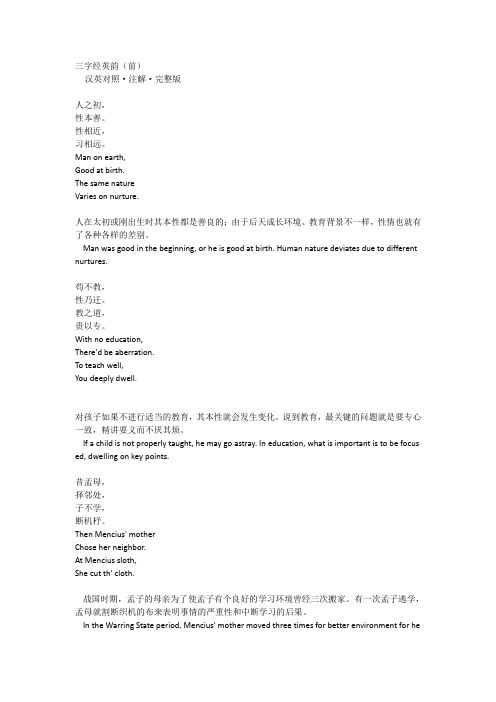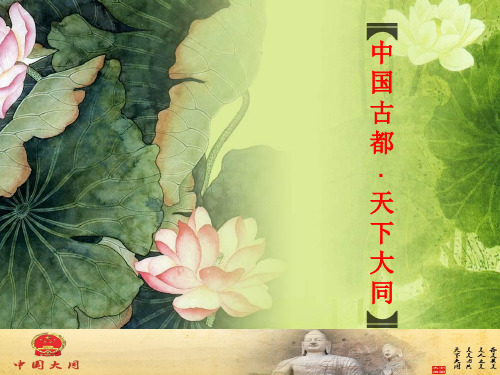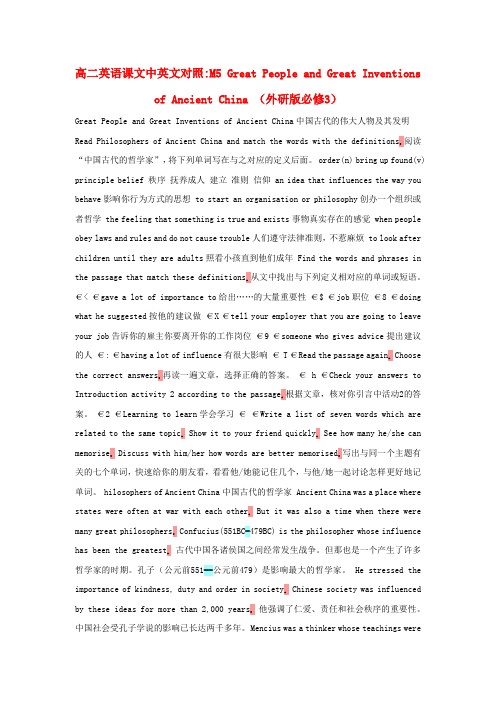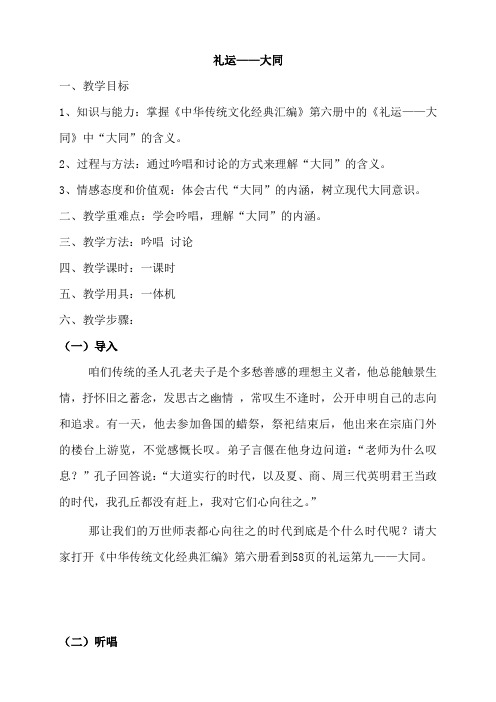礼运大同篇 中英文版
礼运大同篇原文及翻译

礼运大同篇原文及翻译如下:原文:昔者仲尼与于蜡宾,事毕,出游于观之上,喟然而叹。
仲尼之叹,盖叹鲁也。
言偃在侧,曰:“君子何叹?”孔子曰:“大道之行也,与三代之英,丘未之逮也,而有志焉。
大道之行也,天下为公。
选贤与能,讲信修睦,故人不独亲其亲,不独子其子,使老有所终,壮有所用,幼有所长,鳏寡孤独废疾者皆有所养,男有分,女有归。
货恶其弃于地也,不必藏于己;力恶其不出于身也,不必为己。
是故谋闭而不兴,盗窃乱贼而不作,故外户而不闭,是谓大同。
今大道既隐,天下为家。
各亲其亲,各子其子,货力为己,大人世及以为礼。
城郭沟池以为固,礼义以为纪。
以正君臣,以笃父子,以睦兄弟,以和夫妇,以设制度,以立田里,以贤勇知,以功为己。
故谋用是作,而兵由此起。
禹、汤、文、武、成王、周公,由此其选也。
此六君子者,未有不谨于礼者也。
以著其义,以考其信,著有过,刑仁讲让,示民有常。
如有不由此者,在势者去,众以为殃,是谓小康。
翻译:以前孔子曾参加蜡祭陪祭者的行列,仪式结子后,出游到阙上,长声叹气。
孔子叹气,大概是叹鲁国吧!子游在旁边问:您为什么叹气呢?孔子说:大道实行的时代和夏商周三代英明杰出的君主当政的时代,我虽然没年赶上,可是我心里向往(那样的时代)!大道实行的时代,天下是人们所共年的。
大家推选年道德年才能的人来治理国家,彼此之间讲诚信,和睦相处。
所以人们不仅仅只敬奉自己的亲人,也不仅仅只慈爱自己的子女,种老年人都能安度晚年,壮年人都年工作可做,幼年人都能健康成长,矜寡孤独和残废年病的人,都能得到照顾。
男子都年职业,女子都适时而嫁。
对于财物,人们只是不愿让它遗弃在地上,倒不一定非藏到自己家里不可;对于气力,人们所怕不是出在自己身上,倒不一定是为了自己。
所以勾心斗角的事没年市场,明抢暗偷作乱害人的现象绝迹。
所以,门户只须从外面带上而不须用门上锁。
这就叫大同。
现在的大同社会的准则已经消逝不见了,天下成为一家所年,人们各自亲其双亲,各自爱其子女,财物和劳力;都为私人拥年。
三字经英文版-赵彦春

三字经英韵(前)汉英对照·注解·完整版人之初,性本善。
性相近,习相远。
Man on earth,Good at birth.The same natureVaries on nurture.人在太初或刚出生时其本性都是善良的;由于后天成长环境、教育背景不一样,性情也就有了各种各样的差别。
Man was good in the beginning,or he is good at birth.Human nature deviates due to different nurtures.苟不教,性乃迁。
教之道,贵以专。
With no education,There'd be aberration.To teach well,You deeply dwell.对孩子如果不进行适当的教育,其本性就会发生变化。
说到教育,最关键的问题就是要专心一致,精讲要义而不厌其烦。
If a child is not properly taught,he may go astray.In education,what is important is to be focus ed,dwelling on key points.昔孟母,择邻处,子不学,断机杼。
Then Mencius'motherChose her neighbor.At Mencius sloth,She cut th' cloth.战国时期,孟子的母亲为了使孟子有个良好的学习环境曾经三次搬家。
有一次孟子逃学,孟母就割断织机的布来表明事情的严重性和中断学习的后果。
In the Warring State period,Mencius'mother moved three times for better environment for her son.Mencius once played truant,and she cut the cloth she was weaving to show her seriousnes s and the consequences of interrupted learning.窦燕山,有义方,教五子,名俱扬。
大同介绍英文版

Mount Heng
Mount Heng
Mount Heng,Hanging Monastery 恒山悬空寺
Datong Volcano
Datong East Wall
Datong East Wall
Datong South Wall
Datong noodles is tasty and inexpensive, and it has high quality.
each other and the river faces the palace each other 云冈石窟山堂水殿
云冈石窟山堂水殿
Yungang Grottoes 礼佛大道
Premier Zhou Enlai visited Yungang Grottoes.
北岳恒山—Mount Heng is
Yungang Grottoes is located in the south of Wuzhou Mountain and far awa 16 kilometers from the city of Datong. Yungang Grottoes is the cultural heritage of the world, national 5A scenic spot in China and one of the largest grottoes in China. Yungang Grottoes was built in the Northern Wei Dynasty in 460 and had a history of about 1500 years. It has 45 main grottos, over 1,200 niches and over 51,000 Buddhist statues
最新-高中英语 课文中英文对照M5 外研版必修3 精品

高二英语课文中英文对照:M5 Great People and Great Inventions of Ancient China (外研版必修3)Great People and Great Inventions of Ancient China中国古代的伟大人物及其发明Read Philosophers of Ancient China and match the words with the definitions.阅读“中国古代的哲学家”,将下列单词写在与之对应的定义后面。
order(n) bring up found(v) principle belief 秩序抚养成人建立准则信仰 an idea that influences the way you behave影响你行为方式的思想 to start an organisation or philosophy创办一个组织或者哲学 the feeling that something is true and exists事物真实存在的感觉 when people obey laws and rules and do not cause trouble人们遵守法律准则,不惹麻烦 to look after children until they are adults照看小孩直到他们成年 Find the words and phrases in the passage that match these definitions.从文中找出与下列定义相对应的单词或短语。
€< €gave a lot of importance to给出……的大量重要性€$ €job职位€8 €doing what he suggested按他的建议做€X €tell your employer that you are going to leave your job告诉你的雇主你要离开你的工作岗位€9 €someone who gives advice提出建议的人€: €having a lot of influence有很大影响€ T €Read the passage again.Choose the correct answers.再读一遍文章,选择正确的答案。
Mencius 孟子(英文版)

Mencius 孟子(英文版)Mencius (Selections)Translated by Charles Muller, Tōyō Gakuen UniversityUpdated: August 14, 2003Table of Contents1A. King Hui of Liang (part one)1B. King Hui of Liang (part two)2A. Kung Sun Ch'ou (part one) 公孫丑上3A. T’e ng Weng Kung (part one)3B. T’eng Weng Kung (part two)4A. Li Lou (part one) 離婁上4B. Li Lou (part two) 離婁下6A. Kao Tzu (part one) 吿子上6B. Kao Tzu (part two) 吿子下7A. Chin Hsin (part one) 盡心上7B. Chin Hsin (part two) 盡心下1A. King Hui of Liang (part one)孟子見梁惠王。
王曰,「叟,不遠千里而來,亦將有以利吾國乎?」孟子對曰,「王何必曰利?亦有仁義而已矣。
」「王曰:『何以利吾國?』大夫曰:『何以利吾家?』士庶人曰:『何以利吾身?』上下交征利,而國危矣!萬乘之國弑其君者,必千乘之家;千乘之國,弑其君者,必百乘之家。
萬取千焉,千取百焉,不爲不多矣;苟爲後義而先利,不奪不饜。
」「未有仁而遺其親者也,未有義而後其君者也。
」「王亦曰仁義而已矣,何必曰利?」[1A:1] Mencius went to see King Hui of Liang. The King said: "My good man, since you haven't thought one thousand li too far to come and see me, may I presume that you have something with which I can profit my kingdom?"Mencius said: "Why must you speak of profit? What I have for you is Humaneness and Rightness, and that's all. If you always say 'how can I profit my kingdom?' your top officers will ask, 'how can we profit our clans?' The elites (shi)1 and the common people will ask: 'How can we profit ourselves?' Superiors and inferiors will struggle against each other for profit, and the country will be in chaos.""In a kingdom of ten thousand chariots, the murderer of the sovereign is usually from a clan of one thousand chariots. In a thousand-chariot kingdom, the murderer of the sovereign is usually from a clan of one hundred chariots. Now, to have a thousand in ten thousand, or one hundred in a thousand is not really all that much. But if you put due-giving last and profit first, no one will be satisfied unless they can grab something.""There has never been a humane man who neglected his parents, and there has never been a just man who put his prince last in his priorities. King, can't we limit our conversation to humaneness and due-giving? Why must we discuss profit?"梁惠王曰:「寡人之於國也,盡心焉耳矣!河內凶,則移其民於河東,移其粟於河內;河東凶亦然。
礼运大同篇

礼运——大同一、教学目标1、知识与能力:掌握《中华传统文化经典汇编》第六册中的《礼运——大同》中“大同”的含义。
2、过程与方法:通过吟唱和讨论的方式来理解“大同”的含义。
3、情感态度和价值观:体会古代“大同”的内涵,树立现代大同意识。
二、教学重难点:学会吟唱,理解“大同”的内涵。
三、教学方法:吟唱讨论四、教学课时:一课时五、教学用具:一体机六、教学步骤:(一)导入咱们传统的圣人孔老夫子是个多愁善感的理想主义者,他总能触景生情,抒怀旧之蓄念,发思古之幽情,常叹生不逢时,公开申明自己的志向和追求。
有一天,他去参加鲁国的蜡祭,祭祀结束后,他出来在宗庙门外的楼台上游览,不觉感慨长叹。
弟子言偃在他身边问道:“老师为什么叹息?”孔子回答说:“大道实行的时代,以及夏、商、周三代英明君王当政的时代,我孔丘都没有赶上,我对它们心向往之。
”那让我们的万世师表都心向往之的时代到底是个什么时代呢?请大家打开《中华传统文化经典汇编》第六册看到58页的礼运第九——大同。
(二)听唱首先呢,我们一起来听听著名学者徐健顺教授吟唱的《礼运——大同篇》——大道之行也,天下为公。
选贤与能,讲信修睦。
故人不独亲其亲,不独子其子,使老有所终,壮有所用,幼有所长,矜寡孤独废疾者,皆有所养。
男有分,女有归。
货恶其弃于地也,不必藏于己;力恶其不出于身也,不必为己。
是故谋闭而不兴,盗窃乱贼而不作,故外户而不闭,是谓大同。
(三)教唱非常优美的一段吟唱,现在,请大家跟我一起来唱两遍。
注意:请把你们嗓子的音量调大一点,大家准备好了吗?(教2遍)(四)跟唱好,现在,我再把视频打开,我们一起来跟着视频试一试,看大家能不能把它唱下来。
注意:请把你们嗓子的音量调大一点,大家准备好了吗?请看视频(唱)。
大家觉得自己表现怎么样?(很好),所以——掌声送给自己!(五)吟唱我们现在把视频关掉,我给大家起个头,大家再试试。
(六)比赛分组比赛:先小组比,然后男女生比。
(七)讨论这段以“人”为本,从“仁爱”出发的文言文言简意赅,把一个大同世界的理想蓝图勾勒了出来,就像是一幅印象派的画,朦胧之间留给观者无数的想象的空间。
(完整版)《礼运大同篇》全文及注解

孔子《礼运大同篇》全文及注解
全文
大道之行也天下为公,选贤与能,讲信修睦。
故人不独亲其亲,不独子其子.
使老有所终,壮有所用,幼有所长,
鳏寡孤独廢疾者,皆有所养。
男有分,女有归。
货,恶其弃于地也,不必藏于己;
力,恶其不出于身也,不必为己。
是故谋闭而不兴,盗窃乱贼而不作。
故外户而不闭,是谓大同。
注解
大道通行全世界,全世界之人皆以道心相待。
选出真正贤能之人為民服務,大家非常信实和睦。
道心不退,精进不懈,所以人們不单只亲愛自己之亲人;
不只愛护自己之子女,同时也爱护他人之子女。
使老年人退休后,能安享清福,而不辛劳終生;
壯年人各有所用,而不遊手好闲;
幼年人有所教养,而不放荡成性。
并且老而无妻者、老而无夫者、老而无子者、残障病者都能得到最妥当、最关切之照顾。
男子有适当的工作,女子有很好的归宿.
物质生活非常丰足,任人享用,但不恣意浪费,且也不占为己有,不坐享其成。
虽然各尽其职各尽其力,卻不自私为己.
所以一切私心小智,阴谋诡诈永不发生.
一切抢盗偷窃,乱贼暴徒永远绝迹。
因此外出或夜晚,门戶不必关闭也安然无事,这便是大同世界,人间净土。
礼记礼运大同篇读后感

礼记礼运大同篇读后感礼记礼运大同篇读后感【11】大道之行也,天下为礼记礼运大同篇读后感【公。
选贤与能,讲信修睦,故人不独亲其亲,不独子其子,使老有所终,壮有所用,幼有所长,矜寡孤独废疾者,皆有所养。
男有分,女有归。
货恶其弃于地也,不必藏于己;力恶其不出于身也,不必为己。
是故谋闭而不兴,盗窃乱贼而不作。
故外户而不闭,是谓大同。
读《礼记·大同》篇,看注释,大概知其意,无深厚古文功底,观现实之状态,遂作以下解读,姑妄看之。
一是大同世界存在的可能性。
如果按照正常的逻辑,社会是向前发展的,社会的文明程度也是逐渐提高的。
夏、商、周真的有过如此高的文明,值得怀疑。
当然我们可以理解为当时物质溃乏,人们必须相互帮助,才能生存下来。
试想,当人的生存成为问题的时候,出现这种和谐和友善,就算是一种本能的反应,但这只是一个方面,人具有两面性,对于生存的本能,可能也会有更多的暴力和野蛮存在,只是这种事情谁也无法考证。
就像农村的老太婆喜欢念叨,我们年青的时候社会风气如何如何好,人如何能干等等,但真让她选择,她还是会选择现在。
退一步说,就算当时人们因为生存的原因,相互协助,从严格意义上讲也不能称为文明。
随着社会经济文化的发展,出现一些问题,向后看回到那个大同时代也是一种倒退。
社会向前发展,时异则事异,时过境迁,大同社会只适合当时的社会环境,过期作废,历史在向前发展,历史也无法复制。
当然如果作为理想,在下面讨论讨论也未尝不可,至少有利于提高人们的文明素质。
于提高人们的文明素质。
二是对大同制度的探讨。
“选贤与能,讲信修睦”,意思很明白,选拔有能力的人当领导。
中国自古至今都是这么宣扬的,但真正的情况又是怎么样的呢?谁来选,按什么标准来选,这个标准考验过后就是真正的有能力的人吗,标准本身是否存在问题。
当然中国社会的人制状态至今存在,人总是按照自己的意思和喜好来选择,谁也无法超脱。
我们可以理解为当时社会条件艰苦,在和自然的斗争中,身强体壮兼智慧者通过自然的优胜劣汰而成为领导,因为只有他才能胜任这个工作。
- 1、下载文档前请自行甄别文档内容的完整性,平台不提供额外的编辑、内容补充、找答案等附加服务。
- 2、"仅部分预览"的文档,不可在线预览部分如存在完整性等问题,可反馈申请退款(可完整预览的文档不适用该条件!)。
- 3、如文档侵犯您的权益,请联系客服反馈,我们会尽快为您处理(人工客服工作时间:9:00-18:30)。
禮運大同篇英文版.............................................................................................................................................................. .......................
禮運大同篇孔子(西元前551~479年)《禮記卷七,禮運第九》
The World of Da-Tong (Dah-Torng)
Confucius’ Ideal of a Commonwealth State* – a Great Utopia
Li-Yun-Da-Tong (Li-Yun-Dah-Torng) Section, the Record of Rites, Book 9, by
Confucius (BC551~479)
大道之行也,天下為公;
When the Great Dao (Tao, perfect order) prevails, the world is like a
Commonwealth State shared by all, not a dictatorship.
選賢與能,講信修睦;
Virtuous, worthy, wise and capable people are chosen as leaders.
Honesty and trust are promoted, and good neighborliness cultivated.
故人不獨親其親,不獨子其子;
All people respect and love their own parents and children, as well as the parents
and children of others.
使老有所終,壯有所用,幼有所長;
The aged are cared for until death adults are employed in jobs that make full use
of their abilities and children are nourished, educated, and fostered.
鰥寡孤獨廢疾者,皆有所養;
Widows and widowers, orphans and the old without children, the disabled and the
diseased are all well taken care of.
男有分,女有歸;
Every man and woman has an appropriate role to play in society and in the family.
貨惡其棄於地也,不必藏於己;
They hate to see resources lying idle or cast away, yet they do not necessarily
keep them for themselves.
力惡其不出於身也,不必為己;
They hate not to make use of their abilities, yet they do not necessarily work for
their own self-interest.
是故謀閉而不興,盜竊亂賊而不作,故外戶而不閉,
Thus intrigues and conspiracies do not arise, and thievery and robbery do not
occur therefore doors need never be locked.
是謂大同。
This is the ideal world – a perfect world of equality, fraternity, harmony, welfare,
and justice. This is the world called “Da-Tong (Dah-Torng)”.
禮運大同篇
大道之行也,天下為公;選賢與能,講信修睦;故人不獨親其親,不獨子其子;使老有所終,壯有所用,幼有所長;鰥寡孤獨廢疾者,皆有所養;男有分,女有歸;貨惡其棄於地也,不必藏於己;力惡其不出於身也,不必為己;是故謀閉而不興,盜竊亂賊而不作,故外戶而不閉,是謂大同。
礼运大同篇
大道之行也,天下为公;选贤与能,讲信修睦;故人不独亲其亲,不独子其子;使老有所终,壮有所用,幼有所长;鳏寡孤独废疾者,皆有所养;男有分,女有归;货恶其弃于地也,不必藏于己;力恶其不出于身也,不必为己;是故谋闭而不兴,盗窃乱贼而不作,故外户而不闭,是谓大同。
禮運大同篇白話註解
當大道施行之時代,天下國家是大家的,為大家所共有、共治、共享,不是專制私有的;選任賢德且有能力的人來擔任領導者,人人都講求誠實信用,邦族鄉鄰之間彼此修好,和諧、合作、和平;於是人們不只親愛自己的父母至親,不只愛護自己的兒女子弟,也敬愛別人的父母及慈護別人的子女;使老年人獲得安享天年到終老,壯年人都能貢獻才智能力,兒童們皆有良好的養育、教育與培育;鰥夫、寡婦、孤兒、獨老無子的人、以及殘廢、疾病的人,皆能有足夠的照顧和供養;男的各有適當的職份工作,女的各有適合的家庭歸宿;那時人們厭惡將貨物資源廢棄於地上,也不見得只為了自己才護置它;人們嫌惡自己有能力卻不肯出
力,也不見得只為了自己才願出力;所以,就沒有謀財害命的陰謀發生,也沒有偷竊強盜的亂象出現,是故,門戶也不用上鎖防範壞人,這就是所謂的大同世界(是一個平等、博愛、和諧、有福利互助的正義社會)。
The World of Da-Tong (Dah-Torng)
Confucius’ Ideal of a Commonwealth State* – a Great Utopia
Li-Yun-Da-Tong (Li-Yun-Dah-Torng) Section, the Record of Rites, Book 9, by
Confucius (BC551~479)
When the Great Dao (Tao, perfect order) prevails, the world is like a Commonwealth State shared by all, not a dictatorship. Virtuous, worthy, wise and capable people are chosen as leaders. Honesty and trust are promoted, and good neighborliness cultivated. All people respect and love their own parents and children, as well as the parents and children of others. The aged are cared for until death adults are employed in jobs that make full use of their abilities and children are nourished, educated, and fostered. Widows and widowers, orphans and the old without children, the disabled and the diseased are all well taken care of. Every man and woman has an appropriate role to play in society and in the family. They hate to see resources lying idle or cast away, yet they do not necessarily keep them for themselves. They hate not to make use of their abilities, yet they do not necessarily work for their own self-interest. Thus intrigues and conspiracies do not arise, and thievery and robbery do not occur therefore doors need never be locked. This is the ideal world –a perfect world of equality, fraternity, harmony, welfare, and justice. This is the world called “Da-Tong (Dah-Torng)”.。
